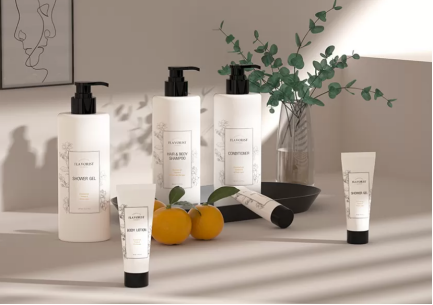As the hospitality industry moves toward greater sustainability, hotels around the world are rethinking how they deliver personal care products in guest rooms. The long-standing practice of offering single-use mini bottles of shampoo, conditioner, and body wash is being replaced by more eco-friendly, refillable wall-mounted dispensers.
This shift raises an important question: Which option makes the most sense—mini bottles or refillable dispensers? This comprehensive comparison explores both solutions from multiple perspectives: cost, environmental impact, guest experience, operational efficiency, and brand image.
Miniature toiletry bottles—typically ranging from 20ml to 50ml—are small, individually packaged plastic containers filled with shampoo, conditioner, or body wash. For decades, they have been a standard feature in hotel guest rooms due to their convenience and perceived luxury.
However, these items are often discarded after a single use, contributing significantly to global plastic waste.
Shampoo dispensers are wall-mounted, refillable systems designed to hold larger volumes (usually between 300ml and 1 liter) of personal care products. They are typically made from durable materials like ABS plastic, stainless steel, aluminum, or eco-composite alternatives.
These dispensers are built for repeated use over several years and can be refilled using bulk containers, reducing packaging waste and labor demands.
Item | Mini Bottles | Shampoo Dispensers |
Upfront Cost | Low | Higher (one-time investment) |
Average Unit Cost | 0.10–0.10–0.30 per bottle | 10–10–30 per unit (plus installation if needed) |
Mini bottles require no infrastructure investment but involve continuous purchases. In contrast, dispensers have a higher initial cost but offer long-term savings through reuse.
Expense Category | Mini Bottles | Shampoo Dispensers |
Product Refill | ~$0.20 per room/day | ~0.05–0.05–0.08 per room/day |
Housekeeping Labor | High (daily replacement required) | Low (bulk refill weekly/bi-weekly) |
Waste Management | High (disposal of hundreds daily) | Low (minimal packaging) |
Theft/Loss | Common (guests take bottles) | Minimal (wall-mounted, not removable) |
· Mini Bottles: Approximately 5,000–5,000–8,000 per year
· Dispensers: Around 2,000–2,000–3,000 in Year 1 (including installation), then 1,200–1,200–1,800 annually
Verdict: While mini bottles have a lower upfront cost, shampoo dispensers provide significant long-term savings, especially for mid- to large-sized hotels.

According to the International Tourism Partnership, hotels worldwide generate over 150 million mini toiletry bottles as plastic waste each year.
· Difficult to recycle due to mixed materials (bottle, cap, label).
· Most end up in landfills or oceans.
· Frequent shipping and production contribute to high carbon emissions.
· Reduce plastic waste by up to 80%.
· Use fewer resources thanks to bulk refills.
· Refill containers are often recyclable or reusable.
Bulk refill packs used in dispenser systems require less energy to produce and transport compared to thousands of individual mini bottles. This leads to a smaller overall carbon footprint.
Governments and regulatory bodies are increasingly targeting single-use plastics:
· California (USA): Ban on small plastic bottles in hotels with 50+ rooms since 2023.
· EU Green Deal: Pushing for circular economy models that reduce packaging waste.
Verdict: From an environmental standpoint, refillable dispensers clearly outperform mini bottles, aligning with global sustainability goals and upcoming regulations.
· Often seen as luxurious or premium.
· However, many guests now view them as outdated or wasteful.
· Risk of leftover product going unused or difficulty opening.
· Modern, clean look that enhances bathroom aesthetics.
· Easier to use, especially for elderly or mobility-impaired guests.
· New designs allow for custom branding
A common concern with dispensers is whether they are sanitary. However, modern hotel-grade dispensers include:
· Lockable systems to prevent tampering
· Regular sanitization protocols during housekeeping
A 2023 survey by HotelierPro found that 72% of guests had no issue with wall-mounted dispensers, especially when hotels emphasized their eco-friendly practices.
While luxury hotels may worry about losing a "premium touch," this can be addressed with:
· High-end dispenser brands such as Rituals, L’Occitane, or Molton Brown
· Custom design and branding options
Verdict: Guest satisfaction depends more on product quality and brand identity than the format itself. With thoughtful implementation, dispensers can enhance rather than diminish the guest experience.
Factor | Mini Bottles | Shampoo Dispensers |
Daily Restocking | Time-consuming | Quick bulk refills |
Inventory Control | Challenging (high shrinkage) | More predictable usage |
Theft Prevention | Poor | Excellent (fixed units) |
Housekeeping Load | High | Lower |
Some hotel chains report saving up to 30 minutes per housekeeping cart after switching to dispensers.
Verdict: Shampoo dispensers streamline operations, reduce workload, and improve inventory control, making them a more efficient choice.
When selecting a dispenser system, consider the following factors:
· Material Durability: Especially important in humid environments.
· Tamper-Resistant Features: To ensure hygiene and security.
· Refill Options: Availability of bulk supply and refill logistics.
· Customization: Private labeling and brand integration.
· Certifications: Look for ISO standards, cruelty-free certifications, or biodegradable formulas.
·
Feature | Mini Bottles | Shampoo Dispensers |
Initial Cost | Low | Medium |
Long-Term Cost | High | Low |
Environmental Impact | Negative (plastic waste) | Positive (reduced waste) |
Guest Perception | Mixed | Increasingly Positive |
Operational Efficiency | Low | High |
Regulation Compliance | Declining | Future-Proof |
For most hotels—especially those with 50+ rooms or those committed to eco-conscious branding—shampoo dispensers are the superior choice. They reduce operating costs, minimize waste, and align with regulatory trends and guest expectations in 2025 and beyond.
If you're considering transitioning to sustainable dispensers for your hotel, start by:
· Requesting quotes from leading bulk suppliers
· Comparing custom branding options
· Evaluating dispenser durability and maintenance needs
Make the switch today—and position your hotel as a leader in sustainable hospitality. Wenesy is your ideal partner. Contact us right now!
Relation Products
Wenesy Cosmetics Ltd.
Copyright © Wenesy Cosmetics Ltd. Sitemap